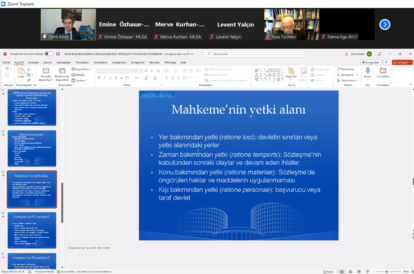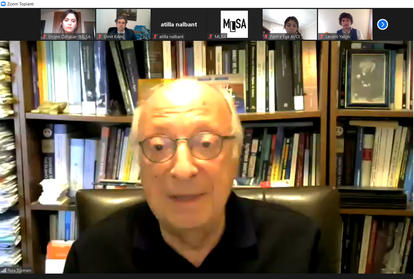Human Rights
Lawyers’ Workshop with MLSA and Diyarbakir Bar Association on Improving Applications to the ECtHR

The workshop, which was held on Zoom, saw a significant turnout of lawyers registered with regional bar associations, including Diyarbakir Bar Association. Legal experts Levent Yalçın, Dr. Atilla Nalbant, Assoc. Prof. Dr. Ümit Kılınç, and Dr. Rıza Türmen delivered presentations and shared insights with participants on how to enhance the admissibility of individual applications to the ECtHR in light of Article 47 of the ECtHR Rules and court practice.
The workshop began with opening speeches by MLSA Co-Director Lawyer Veysel Ok, Diyarbakir Bar Association President Lawyer Nahit Eren, and FNF Program Director Gülçin Sinav, expressing the significance of the workshop in addressing the challenges related to the admissibility of applications to the ECtHR.

In the morning session, moderated by MLSA Legal Unit lawyer Merve Kurhan, Levent Yalçın, a lawyer from the ECtHR Registry, addressed the topic of "How to make a valid application under Article 47?" Yalçın highlighted common mistakes made in applications and drew attention to important details that may lead to applications being deemed inadmissible by the Court. He also answered questions from the participants, providing clarifications and insights.
The workshop continued with a presentation titled "Criteria of admissibility from the perspective of legal practice" by Assoc. Prof. Dr. Ümit Kılınç from the Strasbourg Bar Association. Kılınç, who actively practices law in France, provided concrete examples, highlighting the points that the Court pays attention to in applications and the mechanisms that can be triggered during the initial application. Kılınç also engaged in a question and answer session with the participants, providing further insights and guidance.

In the afternoon session, moderated by Emine Özhasar, a lawyer from the MLSA Legal Unit, Av. Dr. Atilla Nalbant, Head of the Turkey Section at the ECtHR Registry, delivered a presentation titled "Current cases and functioning of the ECtHR." Nalbant provided an overview of the Court's overall workload and highlighted the workload of cases originating from Turkey, as well as the challenges related to the erosion of the rule of law. He emphasized that the growing notion of a "security state" following the July 15th Coup Attempt in Turkey has contributed to an increase in applications from Turkey, particularly in cases involving journalists, human rights defenders, and politicians. Nalbant concluded his presentation by addressing questions from the participants, providing valuable insights on the functioning of the ECtHR in the context of Turkey.
In the final session of the workshop, former ECtHR judge Dr. Rıza Türmen addressed the issue of non-implementation of ECtHR judgments. Türmen highlighted the importance of the ECtHR for Turkey, stating that all social and political issues in the country come before the Court and that the Court's judgments have a significant impact on these issues. He also shared that the ECtHR had written a memorandum to state and government leaders who will attend.
